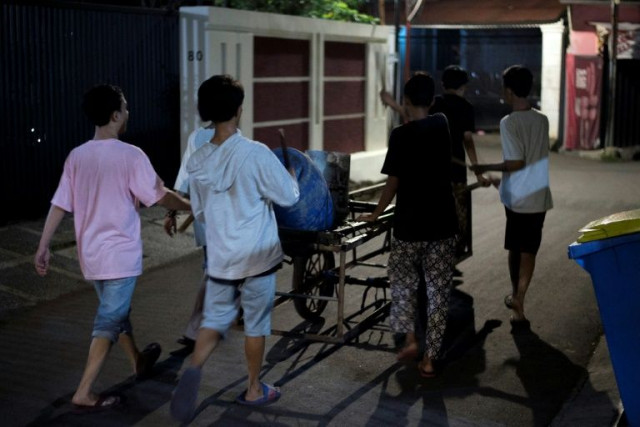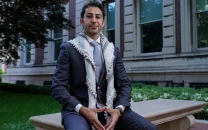Waking up the neighbours: Indonesia's Ramazan alarm clocks
Children wake neighbourhood for Sehri in Jakarta, Indonesia

Children bang drums to wake the neighbourhood for Sehri. PHOTO: AFP
The motley group of children yell and bang on tambourines and drums as they roam the quiet streets of Indonesia's capital on a mission to stir sleeping residents for a pre-dawn meal.
It is Ramazan and millions across the world's biggest Muslim-majority nation are abstaining from eating, drinking, smoking or sex during daylight hours.
The beat is fading for Pakistan's Ramazan drummers
The morning meal, known as Sehri, can be crucial to making it through until sunset without food or drink.
"Sehri! Sehri! Please wake up sir, madam!" hollers the 20-strong group of kids, aged seven to 15.
It's music to the ears of dozens of other children who stream out of their houses to join in, adding the thump of empty paint cans and water jugs to the ensemble.
"This tradition has been around for a long time--every kid is happy to do it," said 13-year-old Ramadin.
"I like it because this not only entertains people, but also helps them wake up for the pre-dawn meal."
Their entertainment value is probably a matter of debate.
But many of the kids are part of a Quran study group run by the local mosque which has given its blessing to this midnight madness.
Complaining would be futile.
"They are indeed noisy, but it helps me wake up on time," offers local resident Rosimah, who like many Indonesians goes by one name.
"We are used to it--happens every year," she added.
Smartphone alarms and digital clocks have seen this wake-up tradition gradually decline over the years.
Re-inventing ourselves in Ramazan
But it is still found across the sprawling Indonesian archipelago - especially in smaller communities--which is home to about 260 million people. Nearly 90% are Muslim.
Similar wake-up traditions are also practised in some other Muslim nations during Ramazan, which ends in mid-June.
Most of the Jakarta group's members are known as local troublemakers so conscripting them into religious service is a win-win situation for the neighbourhood--and the mosque.
"Many of these kids have dropped out of school. Some never even went to school. They are unemployed and became street children who cause trouble," Alvanali Panji Prasetyo, an Islamic teacher and group leader, told AFP.
"Thanks to God, the kids are starting to change their attitude after joining the group."



















COMMENTS
Comments are moderated and generally will be posted if they are on-topic and not abusive.
For more information, please see our Comments FAQ